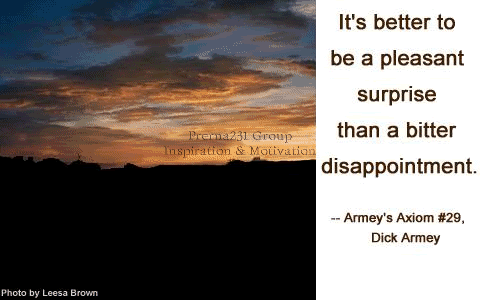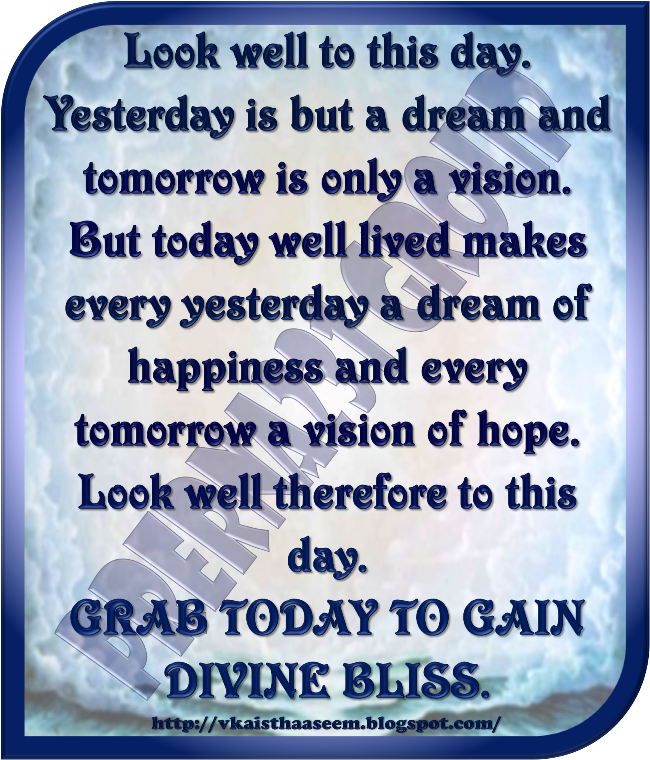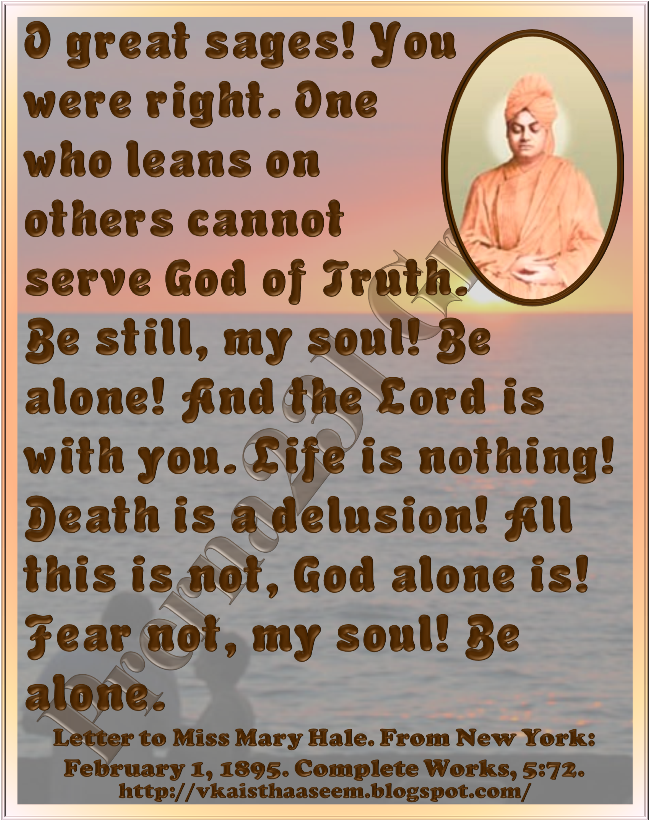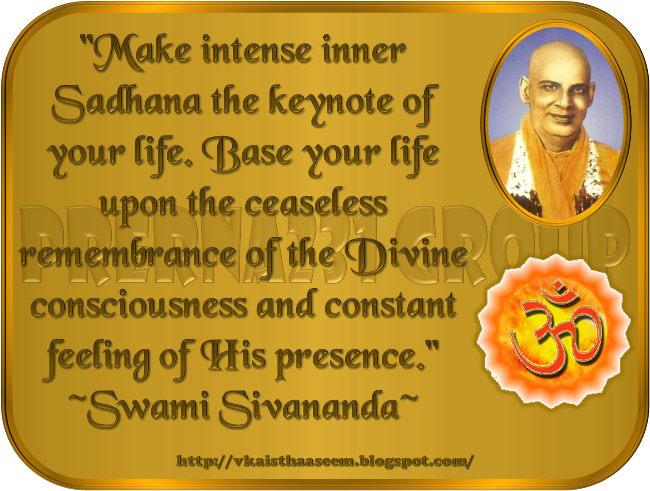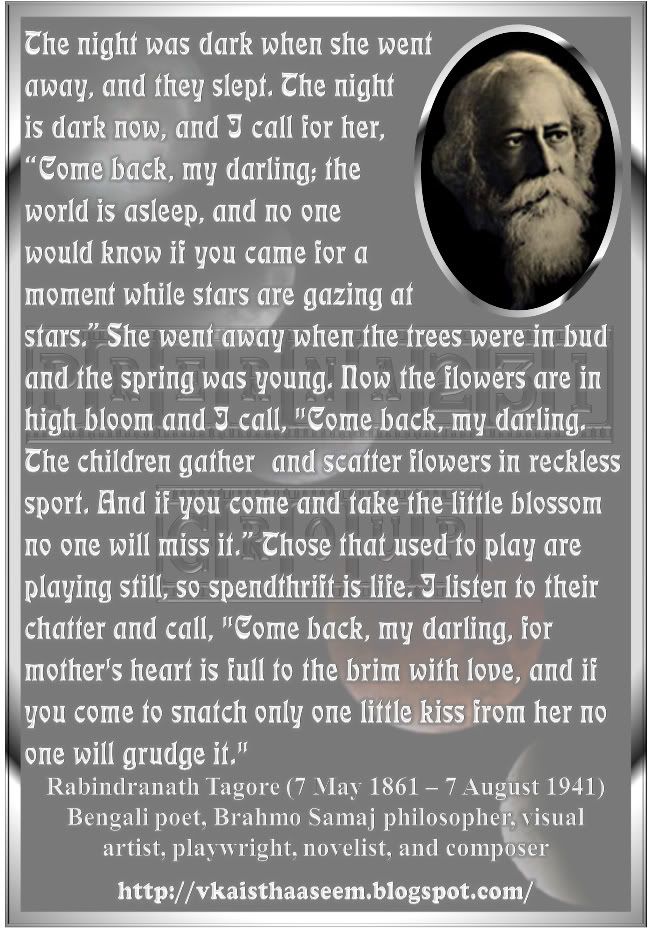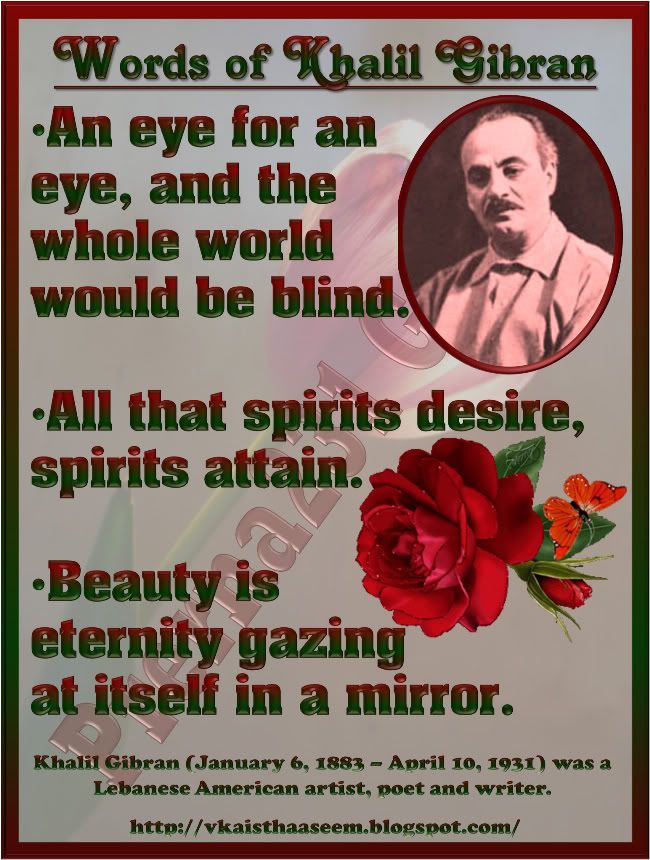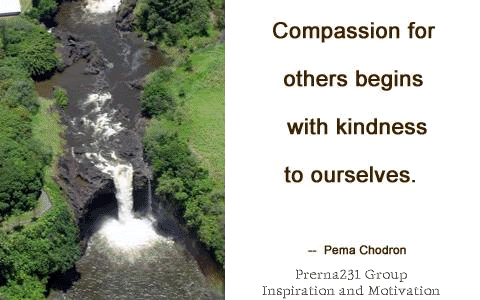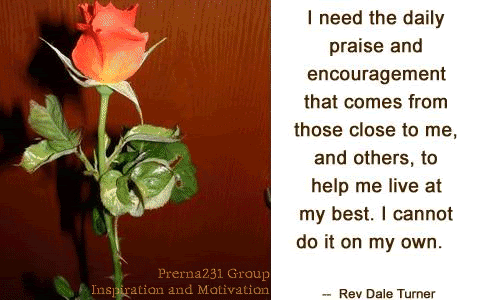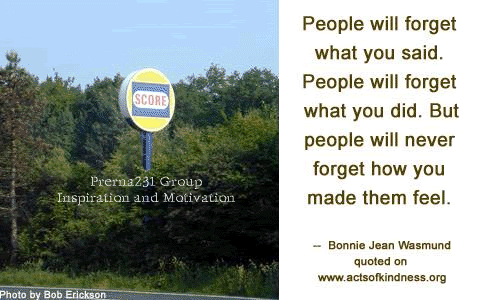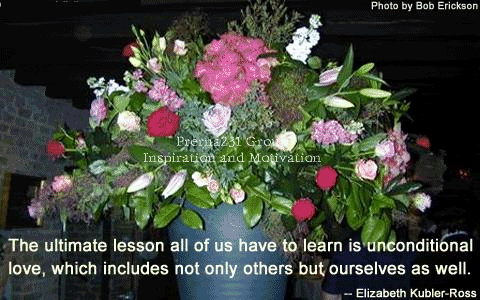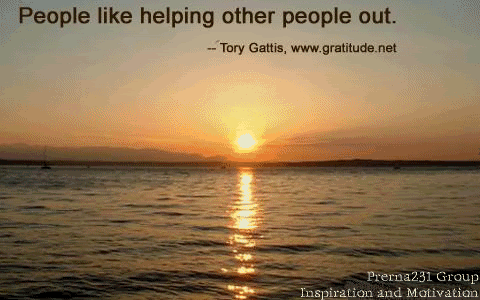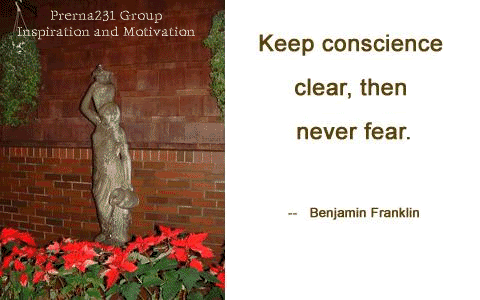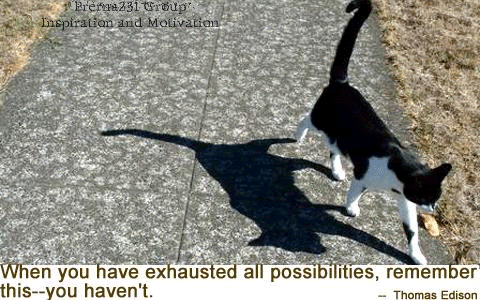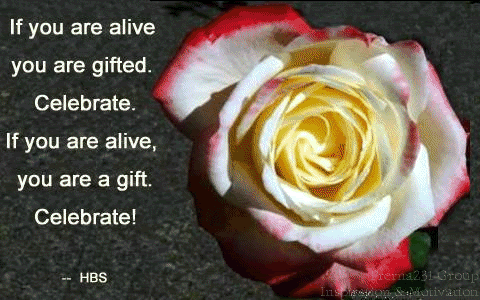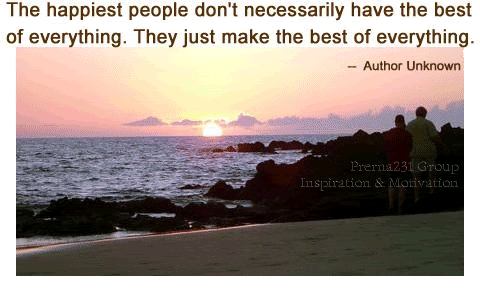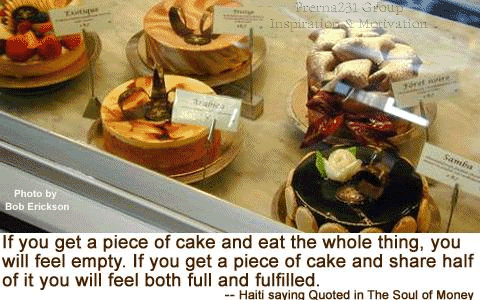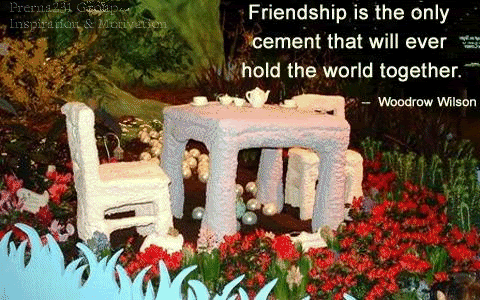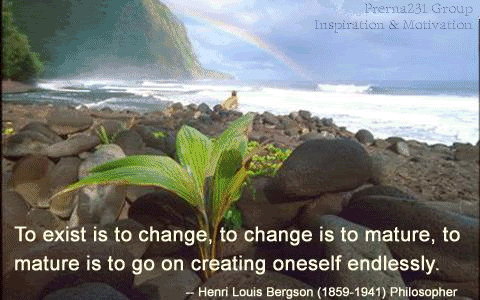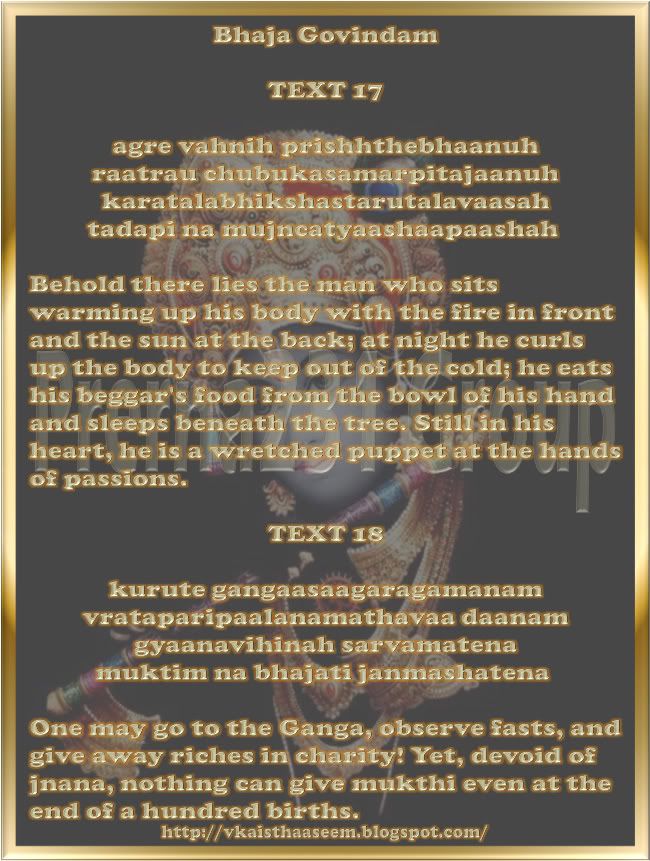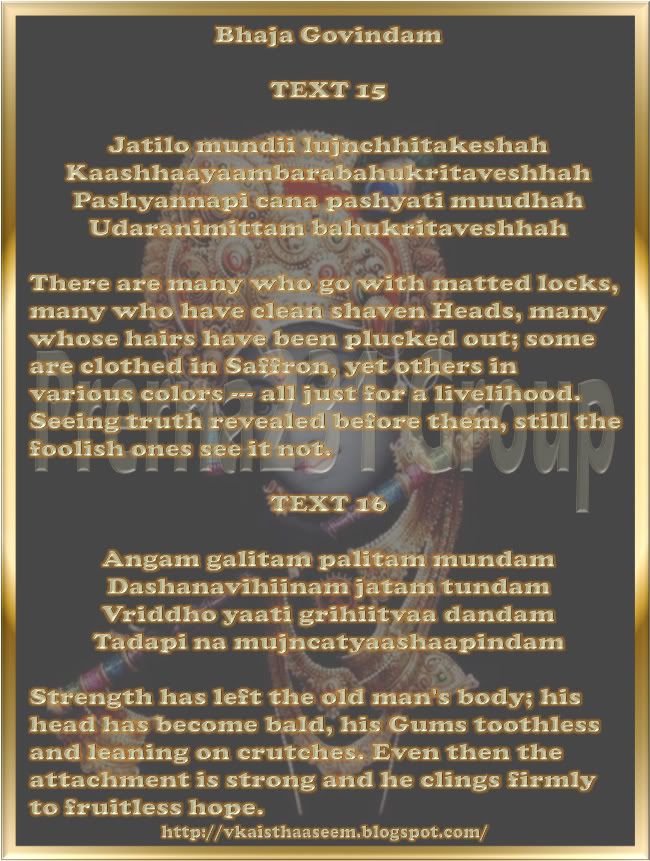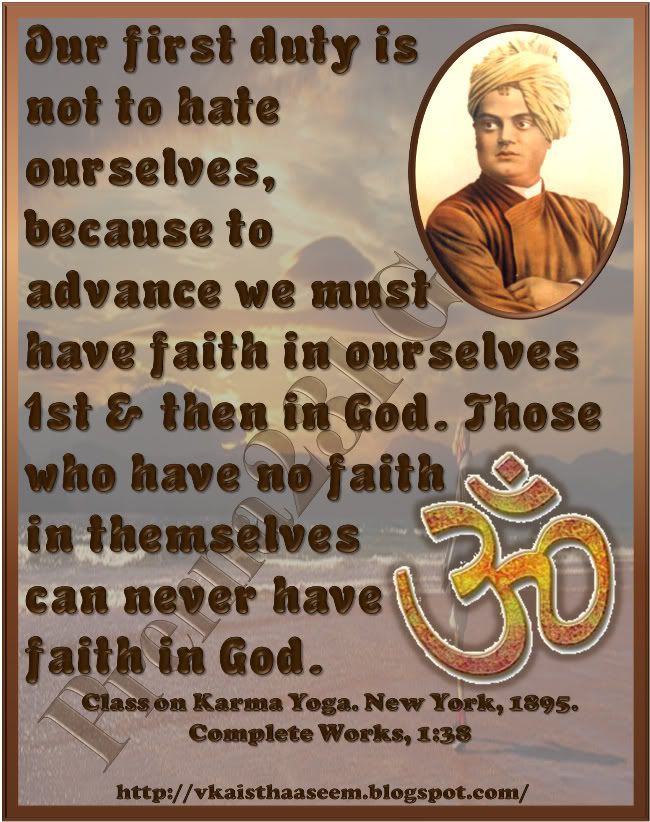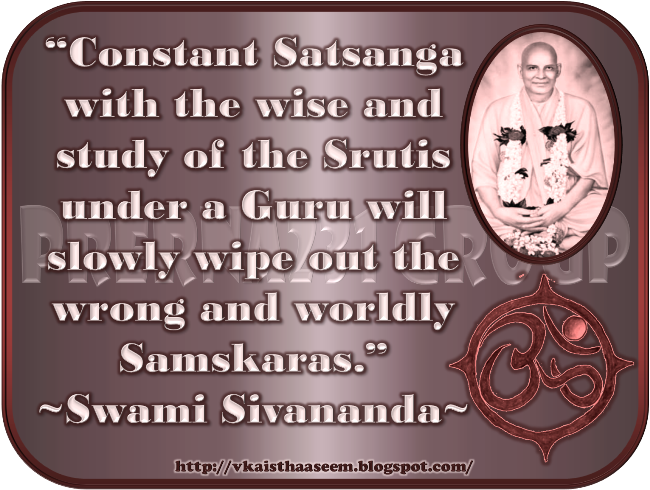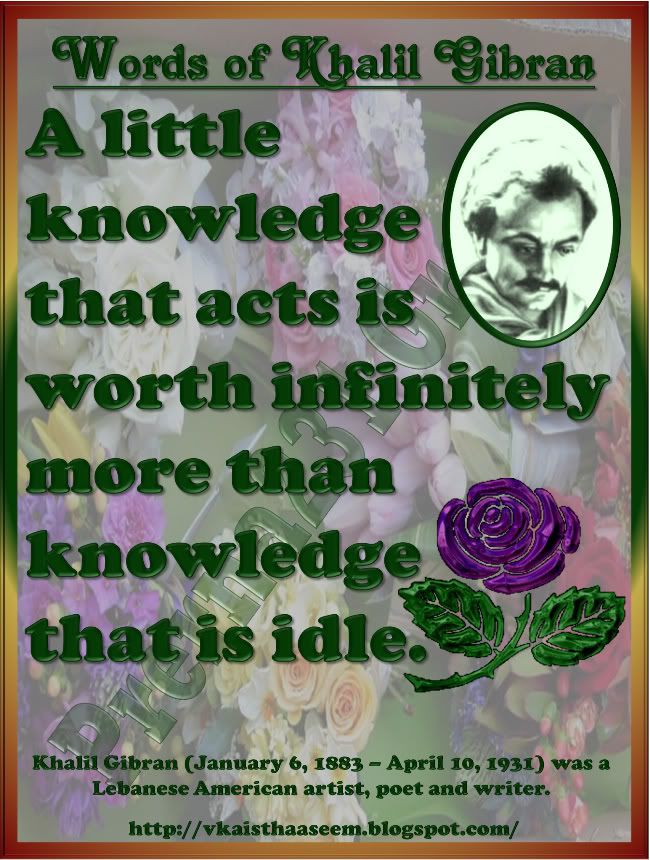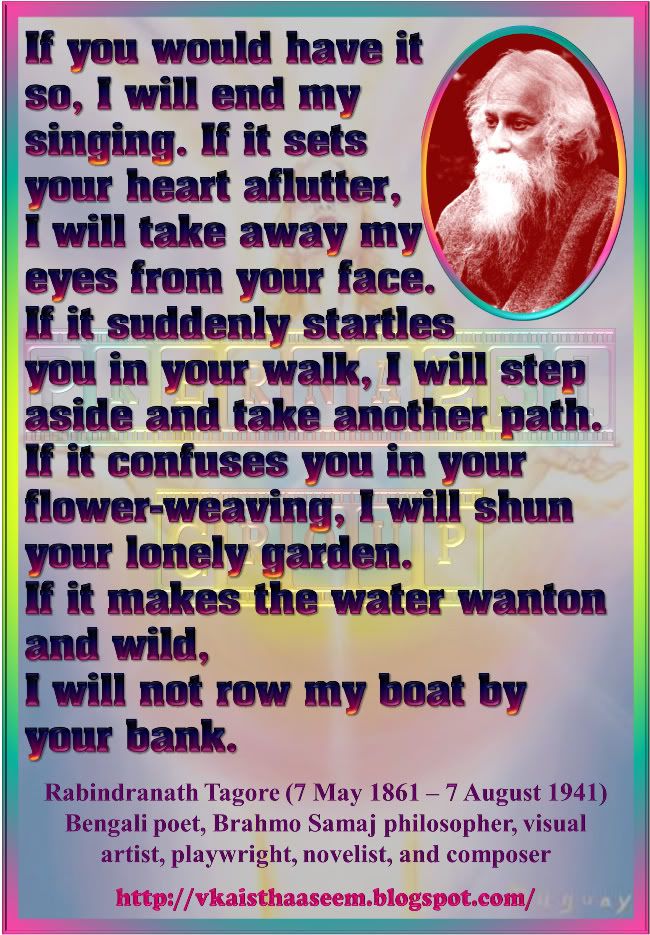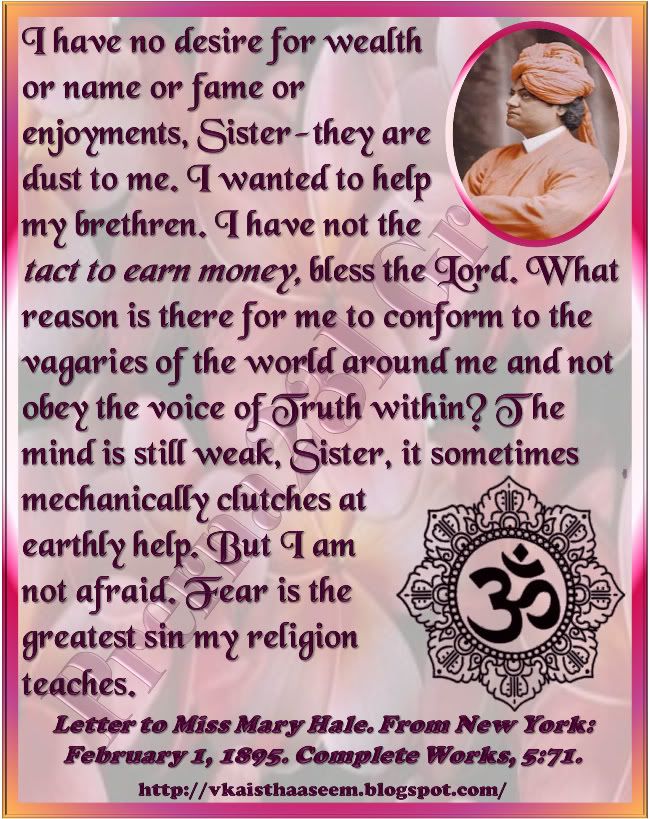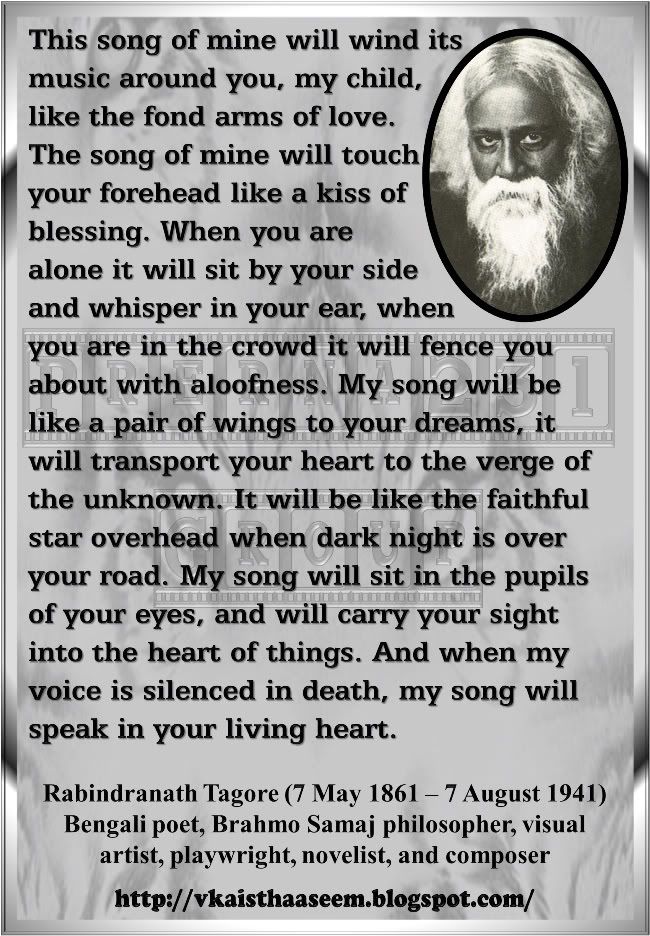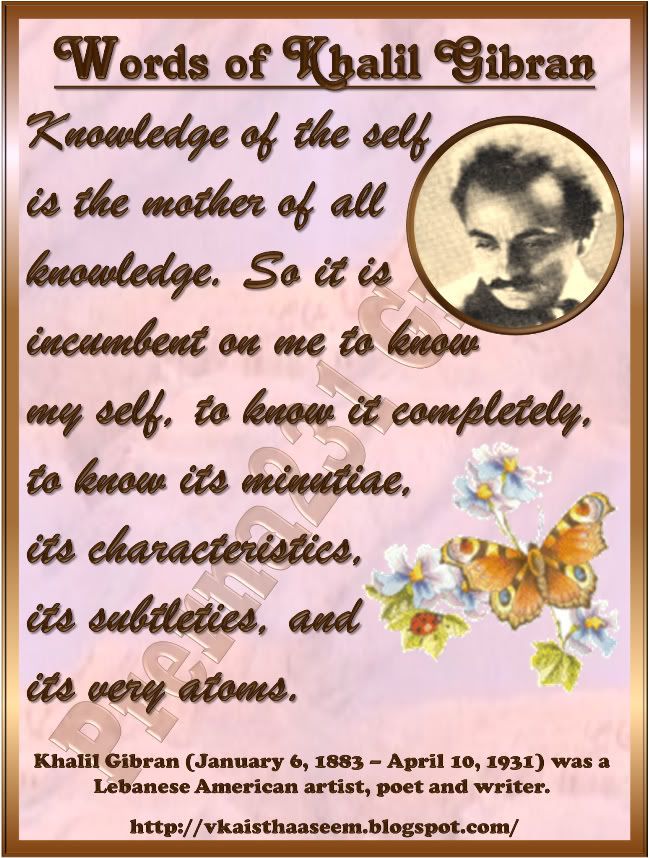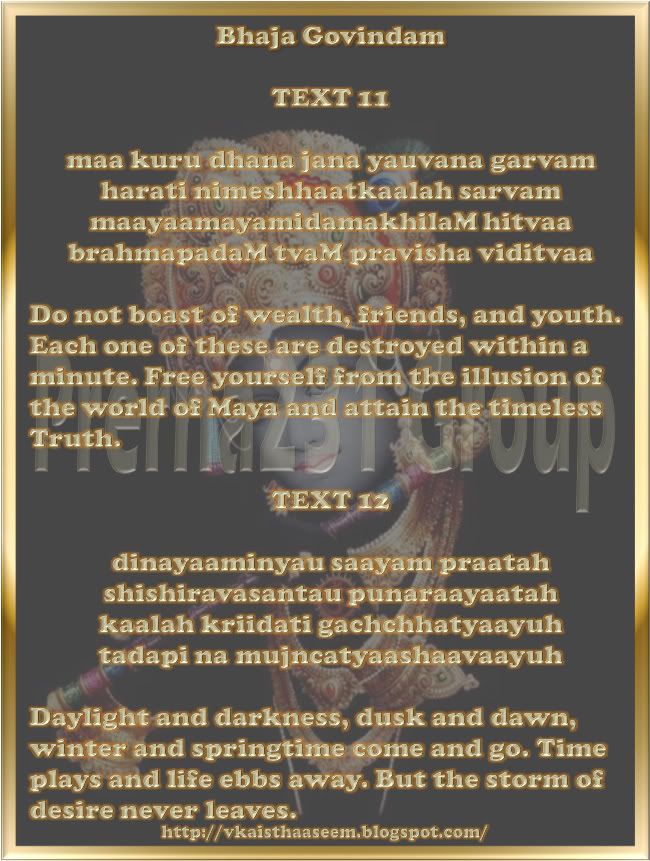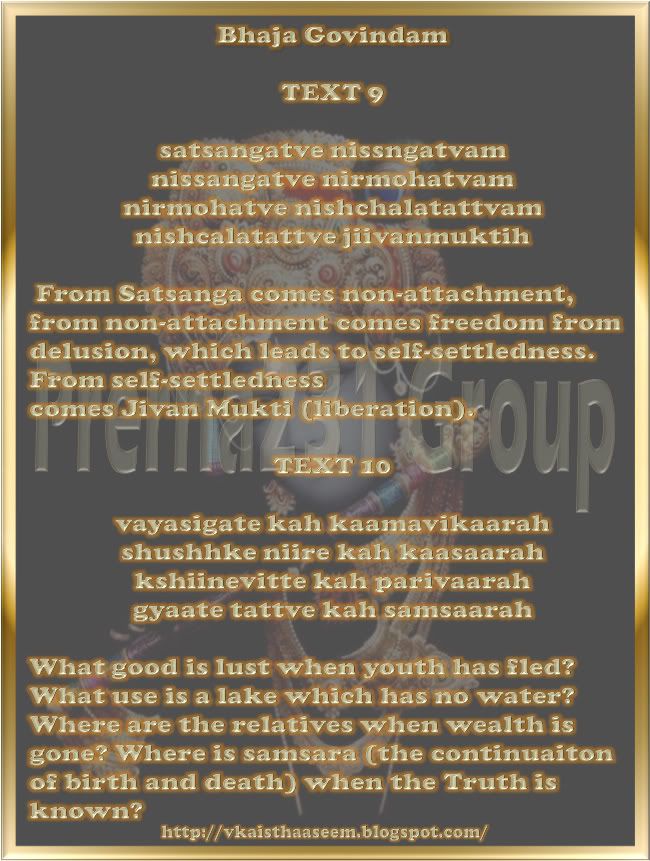Spreading Inspiration, Motivation, Spirituality, Harmony and Happiness… Only mission to Inspire and Motivate people and help them in removing stress, tension, depression etc. Please visit us also on Aseem's Inspirations.
Friday, February 29, 2008
Thursday, February 28, 2008
THE ENLIGHTENED BUTCHER
THE ENLIGHTENED BUTCHER
(A story from Mahabharata)This story from Mahabharata brings to light that our spiritual achievement is useless if we neglect our duties or Dharma.
Kaushika was his parents' only son.
"Mother," he said one day, " I want to go off into the jungle and devote myself to spiritual studies. " 
His mother said with concern, "But son, your father and I are very old. Your father is so sick he can hardly move. If you go away, what will happen to us? Who will attend to our needs?"
Kaushika did not listen. He was determined to study the Vedas. His mother cried in vain as she watched her son turn his back on her and leave for the jungle.
Eventually Kaushika acquired great mystical powers.
One afternoon, as he was meditating under a tree, a crane flew up, and perched herself on a branch above Kaushika. Some bird droppings fell on Kaushika's head. Kaushika furiously threw a fiery gaze at the crane.
The crane immediately fell dead.
The sage felt sorry for what he had done. "How could I have allowed my anger to take over me that way?" He mourned.
Later in the day, he went to a village to beg for alms. The lady of the house asked him to wait and went to get some food. Right then her husband arrived. She immediately set aside the pot of food she was taking to the sage and went to attend her husband.
After washing his feet, giving him food, and attending to his needs, she came back out to give the alms to the sage. The sage was very insulted. "You put your husband before a pious sage? Do you know the power of a Brahmin?"
She calmly replied, "Yes, a true Brahmin is he who has mastered his anger. Please do not threaten me, I am not a crane that will die by your fiery gaze."
The sage was amazed. "How does she know about the crane?" he wondered.
The lady continued, "Oh holy one! You are a learned Brahmin but you have not understood the truth about virtue. If you want to be enlightened, go to Dharmavyadha who lives in Mathura. Any one will tell you where he lives."
The sage thanked the lady and hurried to Mathura. "He must be a great and learned sage indeed," Kaushika thought to himself.
But when he finally reached Dharmavyadaha's place, he found it to be a butcher shop!
A very ordinary looking man came out and said, "Welcome holy one. I am Dharmavyadaha, the man you seek."
"How can a butcher be spiritually enlightened?" Kaushika asked in amazement.
Dharmavyadaha smiled and said with compassion, "I know the story of the crane and of the woman who sent you here. Come, let us go to my house. "
The sage could not contain himself and blurted out, "But butchering animals is such a sinful profession! Are you not ashamed?"
"I am not," the butcher calmly said. "I am engaged in a family trade. I work hard and honestly at it. There is no reason for me to be ashamed of my work!"
"Holy one," continued the butcher. "If I do injury to other creatures, so do you as you did to the crane. "
"As we walk on the soil, we are trampling on numerous creatures. Nor is the air devoid of creatures."
"You see that farmer tilling the land? He is killing so many animals that thrive under the soil."
They reached the butcher's house. The butcher's wife was doing her house hold chores and his two boys were playing.
The butcher introduced the sage to his wife and boys.
Then the butcher entered the house and touched his parents' feet.
"Here is a learned Brahmin who has come from a far-off place." the butcher told his old father.
"Welcome, holy one," the father said.
Before leaving the room, the butcher remarked, "My parents are my Gods. My wife and my children attend to them with devotion and love. We consider caring for them to be our greatest duty." 
"In doing one's duty cheerfully, lies true virtue. This is what the dutiful wife sent you to learn."
"Oh learned one!" the butcher continued, "You have run away from your responsibilities and deserted your aged father and mother. Spiritual achievement is useless if one has neglected one's Dharma, or duties."
The sage remembered his mother crying, "Who will look after us when you are gone my son?"
The sage apologized, "You have shown me the path of true virtue, the true meaning of Dharma, Oh pious one. I am deeply indebted to you."
Kaushika immediately returned to his parents and served them lovingly till the end of their days.
Letter to my Grandchildren
Author Unknown
To my beautiful grandchildren...
Our world is changing so fast and there are many things I wish for you...
I'd really like for you to know about hand-me-down clothes and homemade ice cream and leftover meat loaf sandwiches. I really would.
I hope you learn humility by being humiliated, and that you learn honesty by being cheated.
I hope you learn to make your own bed and mow the lawn and wash the car.
And I really hope nobody gives you a brand new car when you are sixteen.
I hope you get a black eye fighting for something you believe in.
I hope you have to share a bedroom with your younger brother or sister.
And it's all right if you have to draw a line down the middle of the room, but when they want to crawl under the covers with you because they're scared, I hope you let them.
When you want to see a movie and your little brother or sister wants to tag along, I hope you'll let them.
I hope you have to walk uphill to school with your friends and that you live in a town where you can do it safely.
On rainy days when you have to catch a ride, I hope you don't ask your driver to drop you two blocks away so you won't be seen riding with someone as uncool as your Mom.
If you want a slingshot, I hope your Dad teaches you how to make one instead of buying one.
I hope you learn to dig in the dirt and read books.
When you learn to use computers, I hope you also learn to add and subtract in your head.
I hope you get teased by your friends when you have your first crush, and when you talk back to your mother that you learn what ivory soap tastes like.
May you skin your knee climbing a mountain, burn your hand on a stove and stick your tongue on a frozen flagpole.
I don't care if you try a beer once, but I hope you don't like it.
And if a friend offers you dope or a joint, I hope you realize he is not your friend.
I sure hope you make time to sit on a porch with your grandparents and go fishing with your uncle.
These are just some of the things that I wish for you - tough times and disappointment, hard work and happiness. To me, it's the only way to appreciate life.
The Four Way Test
The man was Herbert J. Taylor who surveyed the way the company did it's business, which was the sale of aluminium pots and pans. The nature of the industry was fraught with unethical business practices. To bring the business out of bankruptcy Taylor knew that he had to change the way business was conducted. Ultimately he developed a very simple business philosophy that all employees were to follow in all of their business dealings with customers, suppliers and associates. The philosophy changed the business, turned the business around and ultimately brought it out of bankruptcy.
The business philosophy is a simple four step decision making tool. It didn't tell people what to do or how to think, but it did give them a tool to use in all of their business dealings. The tool is now well known to anyone that has ever associated themselves with Rotary International. It is simple The Four Way Test. The tip is to use this simple decision making tool in your life and see if it doesn't make a difference. As people, we must all stand by our personal honesty and integrity. This is a handy and simple test of what you say, do or think. Give it a try in your life.
The Four Way Test
1. Is it the TRUTH?
2. Is it FAIR to all concerned?
3. Will it build GOODWILL and better friendships?
4. Will it be BENEFICIAL to all concerned?
By the way, this tool made Herbert Taylor a multimillionaire in the 1930s. So it's also a very profitable way of doing business.
Author: Unknown
Wednesday, February 27, 2008
Winners Vs. Losers
The Winner is always part of the answer;
The Loser is always part of the problem.
The Winner always has a program;
The Loser always has an excuse.
The Winner says, "Let me do it for you";
The Loser says, "That is not my job."
The Winner sees an answer for every problem;
The Loser sees a problem for every answer.
The Winner says, "It may be difficult but it is possible";
The Loser says, "It may be possible but i t is too difficult."
When a Winner makes a mistake, he says, "I was wrong";
When a Loser makes a mistake, he says, "It wasn't my fault."
A Winner makes commitments;
A Loser makes promises.
Winners have dreams;
Losers have schemes.
Winners say, "I must do something";
Losers say, "Something must be done."
Winners are a part of the team;
Losers are apart from the team.
Winners see the gain;
Losers see the pain.
Winners see possibilities;
Losers see problems.
Winners believe in win-win;
Losers believe for them to win someone has to lose.
Winners see the potential;
Losers see the past.
Winners are like a thermostat;
Losers are like thermometers.
Winners choose what they say;
Losers say what they choose.
Winners use hard arguments but soft words;
Losers use soft arguments but hard words.
Winners stand firm on values but compromise on petty things;
Losers stand firm on petty things but compromise on values.
Winners follow the philosophy of empathy: "Don't do to others what you would not want them to do to you";
Losers follow the philosophy, "Do it to others before they do it to you "
Winners make it happen;
Losers let it happen.
Winners plan and prepare to win.
The key word is preparation
-- Author Unknown
LOVE by Swami Vivekananda
I once had a friend who grew to be very close to me. Once when we were sitting at the edge of a swimming pool, she filled the palm of her hand with some water and held it before me, and said this: "You see this water carefully contained on my hand? It symbolizes Love.
"This was how I saw it: As long as you keep your hand caringly open and allow it to remain there, it will always be there. However, if you attempt to close your fingers round it and try to posses it, it will spill through the first cracks it finds.
This is the greatest mistake that people do when they meet love ... They try to posses it, they demand, they expect ... And just like the water spilling out of your hand, love will retrieve from you. For love is meant to be free,
You can not change its nature.
If there are people you love, allow them to be free beings.
Give and don't expect.
Advise, but don't order.
Ask, but never demand.
It might sound simple, but it is a lesson that may take a lifetime to truly practice.
It is the secret to true love. To truly practice it, you must sincerely feel no expectations from those who you love, and yet an unconditional caring."
Passing thought ... Life is not measured by the number of breaths we take; but by the moments that take our breath away.
DONT Mess with Old People
George Phillips of Meridian, Mississippi was going up to bed when his wife told him that he'd left the light on in the garden shed, which she could see from the bedroom window.
George opened the back door to go turn off the light but saw that there were people in the shed stealing things.
He phoned the police, who asked "Is someone in your house?" and he said "no". Then they said that all patrols were busy, and that he should simply lock his door and an officer would be along when available.
George said, "Okay," hung up, counted to 30, and phoned the police again.
"Hello, I just called you a few seconds ago because there were people stealing things from my shed. Well, you don't have to worry about them now because I've just shot them."
Then he hung up.
Within five minutes three police cars, an Armed Response Unit, and an ambulance showed up at the Phillips' residence and caught the burglars red-handed.
One of the Policemen said to George: "I thought you said that you'd shot them!"
George said, "I thought you said there was nobody available!"
I LOVE IT - Don't mess with old people!!
Speaking with a Neutral Accent (Personal Etiquette)
The way you speak i.e. your voice modulation and accent affect the way people respond to you, what they think of you and also your job prospects. Here are ten tips to help you reduce a regional accent:
1) Study the mouth movements of native speakers and try to mimic them. While watching television, observe the mouth movements of the speakers. Repeat what they are saying, imitating the intonation and rhythm of their speech.
2) Slow down your speech, until you learn the correct intonation and rhythm of English. Native speakers will have a hard time understanding you if you speak too fast with the wrong modulation and rhythm. Don't worry about your listener getting impatient with your slow dialogue - it is more important that everything you say is understood.
3) Listen to the "music" of English. Don't use the music of your native tongue when you are speaking English. Each language has its own way of "singing".
4) Use your dictionary. Familiarize yourself with the phonetic symbols used for different words in the dictionary and look up the correct pronunciation of words that are hard for you to say. This method helps in neutralizing an accent tremendously.
5) Make a list of commonly used words that are difficult to pronounce. Ask a native speaker to pronounce them for you, record these words, listen to them and practice saying them.
6) Buy books on tape. Listen and read at the same time. Record clips of your own voice reading some sections of the book. Compare the sound of your English with that of the speaker from the book on tape.
7) Pronounce the ending of each word. Pay special attention to "s" and "ed" endings.
8) Read aloud in English for fifteen to twenty minutes everyday. This will help you strengthen the mouth muscles that you use when you speak English. Research has shown that it takes about three months of daily practice to develop strong mouth muscles for speaking a new language.
9) Record your own voice and listen for pronunciation mistakes. Many people hate to hear the sound of their voice and avoid having to listen to themselves speaking. However, this is a very important exercise because doing it will help you become conscious of the mistakes that you are making.
10) Be patient. You can change the way you speak but it won't happen overnight. People often expect instant results and give up too soon. You can change the way you sound if you are willing to put some effort into it.
N R Narayana Murthy on education
In a world where knowledge is power and human capital supreme, technically
The quality of technical and management education is becoming critical in today's world. The last two decades have been influenced by globalization, and the effect of globalization is reflected in liberalization of trade and capital markets. Our future will be impacted by forces unleashed by the Internet, the mapping of the human genome, the convergence of technologies and the deregulation of industries. Thus, the 21st century will be primarily shaped by intellectual capital.
There needs to be an increase in the intake in higher educational institutions. Therefore, capacities in the Indian Institutes of Technology, the
liberalize education
The role of government needs to be minimized. Higher education must function as an industry in a free-market environment with suitable regulatory mechanisms. Licensing must be removed in education along the lines of the trade liberalization of the 1990s. Educational institutions must be allowed to function as corporations making their own decisions. Full autonomy needs to be granted to all institutions of higher learning.
private funding
Many prestigious institutions such as MIT and Stanford are funded almost entirely by private money. Our government is facing an era of lack of funds. It is therefore, essential that there is widespread infusion of private money into our higher education system. Market-driven fees will enable universities to provide competitive salaries and scholarships. This will enable them to compete for high quality faculty and students. Colleges must be provided with the latest teaching tools, computers and Internet connectivity.
performance pay
Meritocracy must be introduced among faculty by implementation of pay-for-performance systems. There should be bi-annual student surveys of faculty members. All benefits to faculty members including compensation and promotion must be based on feedback secured from students.
students loans
Subsidies should exist only in basic education and not in higher education. Parents below a certain income level can be given vouchers by the government. These vouchers can then be used for payment to schools and educational institutions. An Educational Development Finance Corporation can be set up to fund higher education through a National Student Loan Program.
If
(This contribution is based on the 4th Ravi Matthai Memorial Lecture organized by the Academy of Human Resources Development and delivered by Murthy recently in Bangalore).
Tuesday, February 26, 2008
Monday, February 25, 2008
Make something beautiful
Make something beautiful
In this way, life moves continually forward. In each moment, you can build upon whatever has come before.
Sometimes things happen just as you expected they would, and then there are times when nothing goes the way you had it planned. In any event, there is a way to respond triumphantly.
Learn to see the value no matter what outer conditions and circumstances may be concealing it. Know that there is value, and you will find it.
Right now, you are where you are supposed to be. For right now, you are where you can truly make a difference.
The ups and downs and ins and outs of life have brought you to this day. And on this day, you can make something beautiful out of it all.
-- Ralph Marston
A Rebellious Little Bird
There was once a little bird who decided to rebel against tradition, and when it came time to fly south for the winter, he decided to stay behind. All the other birds flew south for the warmer weather, leaving the rebellious one alone.
Of course, it wasn't long before the little bird discovered he had made a terrible mistake. Winter set in and it became very cold. So, he decided that he had better take off and fly south like his friends.
He started flying, but didn't get very far before the cold north wind began to freeze his wings, and he went plummeting down, down, down ... He fell straight down from the sky, through an open hole in the rooftop of a nearby barn, and directly into a fresh pile of cow dung.
Well, the warmth thawed out his wings, and soon he was feeling fine again. But, as his little head popped out from the smelly dung, along came a cat who plucked him up and ate him.
Whenever you end up in a pile of DoDo it may not necessarily be a bad thing, and everyone that comes to pull you out of your DoDo may not necessarily be a good thing.
The Most Important Part
My mother used to ask me what is the most important part of the body. Through the years I would take a guess at what I thought was the correct answer.
When I was younger, I thought sound was very important to us as humans, so I said, "My ears, Mommy." She said, 'No. Many people are deaf. But you keep thinking about it and I will ask you again soon.'
She looked at me and told me, 'You are learning fast, but the answer is not correct because there are many people who are blind.'
Stumped again, I continued my quest for knowledge and over the years, Mother asked me a couple more times and always her answer was 'No, but you are getting smarter every year, my child.'
Then last year, my Grandpa died. Everybody was hurt. Everybody was crying. Even my father cried. My Mom looked at me when it was our turn to say our final good-bye to Grandpa. She asked me, 'Do you know the most important body part yet, my dear?'
I was shocked when she asked me this now. I always thought this was a game between her and me. She saw the confusion on my face and told me. 'This question is very important. It shows that you have really lived your life. For every body part you gave me in the past, I have told you was wrong and I have given you an example why. But today is the day you need to learn this important lesson.
She looked down at me as only a mother can. I saw her eyes well up with tears. She said, 'My dear, the most important body part is your shoulder'
I asked, 'Is it because it holds up your head?' She replied, 'No, it is because it can hold the head of a friend or loved one when they cry. Several years passed before she asked me again. Since making my first attempt, I had contemplated the correct answer. So this time I told her, 'Mommy, sight is very important to everybody, so it must be our eyes.'
Everybody, need a shoulder to cry on sometime in life, my dear. I only hope that you have enough love and friends that you will have a shoulder to cry on when you need it.'
Then and there I knew the most important body part is not a selfish one. It is sympathetic to the pain of others.
Message in the Bottle
A man was strolling along the beach one day when he spotted a bottle washed up on the shore. He went over and picked it up, and noticed a message in the bottle. He popped the cork out and inside was a weathered treasure map indicating that there was buried treasure to be found in the shallow waters below. But the man thought it was a hoax, so he slipped the map back in and threw the bottle back into the ocean...
A little later, another man was walking along the beach and the bottle had washed upon the shore. He too picked up the bottle, popped out the cork, and found the treasure map. This man, however, was curious enough to wade into the water and hoped it was buried shallow enough to find. But once the cold ocean waters reached up to his thighs, he decided to quit. "This is not worth it!" he thought to himself. So he scrambled back to shore and chucked the bottle back into the ocean....
A third man was walking by the beach and noticed the bottle washed upon the shore. He went over, opened the bottle and found the map. The map looked authentic enough, and promised great treasure... So he got himself a small raft and set out into the ocean to claim the treasure..he rowed out far enough into the ocean where the "X" on the map was and to his surprise, he saw the glint of something shining in the waters below..he dove into the ocean and swam towards the shining object below..he could see that there was something that looked like a treasure chest, but he couldn't quite reach it and the deeper he went, the greater the cold and pressure on his body and his mind..," I am about to lose my breath, and the longer i take, my raft might be swept away!", he thought. So the man decided to give up the hunt so he would ensure his own life and safety..when he reached the shore once more, he took the bottle from the raft and tossed it back into the ocean...
Finally, one more man was walking along the beach. He noticed the bottle, went over, popped it open, and was excited to find a map promising great treasure. He noticed someone had left a raft by the water's edge, so he took it and paddled out. He too, got far enough to where the "X" marks the spot, and squinted into the waters and saw the shadow and glint of the treasure below. He took a deep breath and plunged into the waters. Like the man before him, the cold, darkness and pressure upon his senses increased as he got closer. He also realized that if he kept swimming, that he might lose his breath, the raft, and even his own life! But this treasure could be worth all the risk and he persisted. Just as he was about to give up, he grabbed the long chain that was binding the chest and pulled it up along with himself back to the surface. He broke the surface of the water gasping and exhausted but with the treasure chest safely in his grasp. He paddled back to the shore, opened up the treasure chest and found what the map had promised--gold, and precious diamonds and jewels that would make him secure for the rest of his life.
A relationship with God is a similar treasure hunt. People hear the same message, but the way they receive it will determine the reward they might find.
Eternal life is waiting for all those who are willing to take that risk to follow God all the way of life, where we find love, forgiveness and life everlasting. ... for eternity.
The Monk's Vision
An old monk prayed many years for a vision from God to strengthen his faith, but it never came. He had almost given up hope when, one day, a vision appeared. The old monk was overjoyed.
But then, right in the middle of the vision, the monastery bell rang. The ringing of the bell meant it was time to feed the poor who gathered daily at the monastery gate. And it was the old monk's turn to feed them. If he failed to show up with food, the poor people would leave quietly, thinking the monastery had nothing to give them that day.
The old monk was torn between his earthly duty and his heavenly vision. However, before the bell stopped tolling, the monk had made his decision. With a heavy heart, he turned his back on the vision and went off to feed the poor.
Nearly an hour later, the old monk returned to his room. When he opened the door, he could hardly believe his eyes. There in the room was the vision, waiting for him. As the monk dropped to is kness in thanksgiving, the vision said to him, "My son, had you not gone off to feed the poor, I would not have stayed."
The best way to serve God is to reach out in service to our brothers and sisters, especially those less gifted than ourselves.
The Master
The Master was searching for a vessel to use; On the shelf there were many - which one would He choose? "Take me", cried the gold one, "I'm shiny and bright, I'm of great value and I do things just right. My beauty and luster will outshine the rest And for someone like You, Master, gold would be the best!"
The Master passed on with no word at all; He looked at a silver urn, narrow and tall; "I'll serve You, dear Master, I'll pour out Your drink, and I'll be at Your table whenever You dine, My lines are so graceful, my carvings so true, And my silver will always compliment You."
Unheeding the Master passed on to the brass, It was wide mouthed and shallow, and polished like glass. "Here! Here!" cried the vessel, "I know I will do, Place me on Your table for all men to view."
"Look at me", called the goblet of crystal so clear, "My transparency shows my contents so dear, Though fragile am I, I will serve You with pride, And I'm sure I'll be happy in Your house to abide."
The Master came next to a vessel of wood, Polished and carved, it solidly stood. "You may use me, dear Master", the wooden bowl said, "But I'd rather You used me for fruit, not for Bread!"
Then the Master looked down and saw a vessel of clay. Empty and broken it helplessly lay. No hope had the vessel that the Master might choose, To cleanse and make whole, to fill and to use.
"Ah! This is the vessel I've been hoping to find, I will mend and use it and make it all Mine." "I need not the vessel with pride of its self; Nor the one who is narrow to sit on the shelf; Nor the one who is big mouthed and shallow and loud; Nor one who displays his contents so proud; Not the one who thinks he can do all things just right; But this plain earthy vessel filled with My power and might."
Then gently He lifted the vessel of clay. Mended and cleansed it and filled it that day. Spoke to it kindly. "There's work you must do, Just pour out to others as I pour into you."
THE TAIL
There is a story about a princess who had a small eye problem that she felt was really bad. Being the king's daughter, she was rather spoiled and kept crying all the time. When the doctors wanted to apply medicine, she would invariably refuse any medical treatment and kept touching the sore spot on her eye. In this way it became worse and worse, until finally the king proclaimed a large reward for whoever could cure his daughter. After some time, a man arrived who claimed to be a famous physician, but actually was not even a doctor.
He declared that he could definitely cure the princess and was admitted to her chamber. After he had examined her, he exclaimed, "Oh, I'm so sorry!" "What is it?" the princess inquired. The doctor said, "There is nothing much wrong with your eye, but there is something else that is really serious." The princess was alarmed and asked, "What on earth is so serious?" He hesitated and said, "It is really bad. I shouldn't tell you about it." No matter how much she insisted, he refused to tell her, saying that he could not speak without the king's permission.
When the king arrived, the doctor was still reluctant to reveal his findings. Finally the king commanded, "Tell us what is wrong. Whatever it is, you have to tell us!" At last the doctor said, "Well, the eye will get better within a few days - that is no problem. The big problem is that the princess will grow a tail, which will become at least nine fathoms long. It may start growing very soon. If she can detect the first moment it appears, I might be able to prevent it from growing." At this news everyone was deeply concerned. And the princess, what did she do? She stayed in bed, day and night, directing all her attention to detecting when the tail might appear. Thus, after a few days, her eye got well.
This shows how we usually react. We focus on our little problem and it becomes the center around which everything else revolves.
Story of Two Screw
Once upon a time there were two screws fastening a vital part of a gasoline engine. One of the screws was haughty and proud of it's shining head. The second screw was quiet, intent only on doing its job to the best of its ability.
One day a speck of rust appeared on the head of the second screw. Filled with vain pride of its own beauty, the first screw began to laugh at the second. "Your head is tarnished," the first said to the second. "Look at you. Your perfect luster is gone."
The second screw said nothing. Instead, it concentrated on what it was doing. "How ugly you have become," the first screw chortled, "and how beautiful I have remained." Then it began to laugh so hard at the second screw that it failed to notice that it was working itself loose. Finally it dropped off the engine and plunged into a small pool of dirty oil below.
With the first screw no longer holding up its end of the load, the second was faced with doing the work of two. Meanwhile the first screw, now covered with grimy oil, wailed and lamented. "Just look at me! I'm dirty and filthy and all my beauty is gone. By laughing at the blemish on my friend the second screw, I worked myself loose and fell into the muck. Now I'm doomed."
Now, it just so happened that a short time later the owner of the engine started it up. He immediately noticed that something didn't sound right -- the engine was running rough. When he checked, he instantly saw that one of the two screws holding the vital part was missing. "Ah ha!" the owner said. "One of the screws must have worked itself loose and fell to the ground, but I don't see it. Maybe it fell into that puddle of old oil."
The owner reached into the oil and found the missing screw. "Look at you," the owner said. "You're all covered with grime and oil. How ugly you are. But I will fix that right away." The owner reached for a nearby rag and wiped all the oil and grime off the first screw until it shone even brighter than before. Then he replaced it on the part. Before he turned away, he noticed a little speck of tarnish on the head of the second screw. With the second rag, he wiped the head clean and bright. Then the owner walked away.
Finally the engine was started. The two screws, now equally beautiful, held the part tight. "Forgive me, my friend," the first screw said to the second. "In my vanity, I was so busy laughing at your blemish that I did not notice that I was working myself loose."
"And what have you learned?" the second screw quietly asked.
"I learned not to judge others because I have my own sins to deal with."
"Then," the second screw said, "I forgive you."
"Thank you, my friend. And rest assured, my vanity will remain forever at the bottom of that dirty puddle of oil."
The Barnyard Duck
A flock of wild ducks were flying in formation, heading south for the winter. They formed a beautiful V in the sky, and were admired by everyone who saw them from below. One day, Wally, one of the wild ducks in the formation, spotted something on the ground that caught his eye. It was a barnyard with a flock of tame ducks who lived on the farm. They were waddling around on the ground, quacking merrily and eating corn that was thrown on the ground for them every day. Wally liked what he saw. "It sure would be nice to have some of that corn," he thought to himself. "And all this flying is very tiring. I'd like to just waddle around for a while."
So after thinking it over a while, Wally left the formation of wild ducks, made a sharp dive to the left, and headed for the barnyard. He landed among the tame ducks, and began to waddle around and quack merrily. He also started eating corn. The formation of wild ducks continued their journey South, but Wally didn't care. "I'll rejoin them when they come back North in a few months, he said to himself.
Several months went by and sure enough, Wally looked up and spotted the flock of wild ducks in formation, heading north. They looked beautiful up there. And Wally was tired of the barnyard. It was muddy and everywhere he waddled, nothing but duck doo. "It's time to leave," said Wally. So Wally flapped his wings furiously and tried to get airborne. But he had gained some weight from all his corn-eating, and he hadn't exercised his wings much either. He finally got off the ground, but he was flying too low and slammed into the side of the barn. He fell to the ground with a thud and said to himself, "Oh, well, I'll just wait until they fly south in a few months. Then I'll rejoin them and become a wild duck again."
But when the flock flew overhead once more, Wally again tried to lift himself out of the barnyard. He simply didn't have the strength. Every winter and every spring, he saw his wild duck friends flying overhead, and they would call out to him. But his attempts to leave were all in vain. Eventually Wally no longer paid any attention to the wild ducks flying overhead. He hardly even noticed them. He had, after all, become a barnyard duck.
Look what happened to Wally. He thought he would just "check-it-out" for awhile and then leave when he wanted to. But he couldn't do it.
Sin and bad habits are like that. It is a trap, and it has a way of changing us into people we don't even want to become. Eventually we lose touch with who we really are . We become barnyard ducks.
A Wise Old Monkey
A king used to maintain a group of monkeys for providing entertainment for his sons. The monkeys were very nicely fed with sumptuous delicacies everyday. The leader of the monkeys was well-versed in the scriptures of like wise personalities and he used to teach the other monkeys these scriptures.There was also a pack of sheep in the king's palace and the little princes used to ride them for fun. One of those sheep was very fond of eating anything from the palace kitchen. The cooks in the kitchen had to beat the sheep quite often to prevent it from causing mischief.
The monkey leader thought that this kind of behaviour every now and then may result in something disastrous for the monkeys in the long run. "The sheep are extremely gluttonous and the cooks, on the other hand, are very adept in beating the sheep with whatever they find at hand. In case the cooks at any time start hitting the sheep with a burning stick from the fire, then the furry body of the sheep would surely start burning.When such a burning sheep starts running around in frenzy and by chance enters into the nearby horse stable, then the hay inside will catch on fire and the entire stable along with its horses will be ablaze in no time. One ancient animal husbandry book prescribes that burns on horse flesh can be healed by animal skin obtained from monkeys. Accordingly, the king will have the monkeys killed."
Apprehending thus, the wise old monkey leader called on all the monkeys confidentially and told them, "In a place like this where the sheep and the cooks are in constant confrontation, we, the monkeys, are sure to meet with our destruction. So, let us take refuge in a forest somewhere before we are destroyed en masse."
But the arrogant young monkeys did not have anyrespect for the wise old monkey's advice. They simply ridiculed the old monkey, saying, "You must be under some sort of delusion due to your advancing age, and so you are talking like a lunatic. We are not interested in leaving the palace for forest life only to live on distasteful fruits; here we are being fed with nectarean varieties of foodstuffs by the princes themselves."
Upon hearing the puffed-up monkeys retorting like this, the old monkey told them with tearful eyes, "O fools, you do not know the results of such pleasure. Don't you know this will be ultimately destructive for you! So let me leave for the forest alone - I don't want to see your deaths."
Saying thus, the monkey-leader started for the forest, leaving behind all the other monkeys.Following this, one day that greedy sheep entered into the kitchen.The cook struck the beast with burning firewood. Immediately the sheep started crying and ran straight into the nearby horse stable. As the sheep, with the fire all over its body, started rolling desperately over the hay-stack kept in the stable, the entire pavilion caught fire and many of the horses were burnt to death while the others just ran amok, resulting in a great consternation all over.
The king immediately summoned his veterinary surgeon for the treatment of the horses. The surgeon quoted Salihotra's prescription that monkey's tallow was essential for the quick healing of the burns suffered by the horses. So the king ordered that treatment should immediately be undertaken to save the horses, and accordingly he also issued his instructions to kill the monkeys to collect their tallow. The monkey leader got the news and was very much depressed.
Those who contemplate that the ageing advisor might be under delusion and may not know more than a common person knows, and instead of following him follow evil companions, will certainly meet with a disastrous end.
The Dark Candle
A man had a little daughter -- an only and much-beloved child. He lived for her -- she was his life. So when she became ill and her illness resisted the efforts of the best obtainable physicians, he became like a man possessed, moving heaven and earth to bring about her restoration to health.
His best efforts proved unavailing and the child died. The father was totally irreconcilable. He became a bitter recluse, shutting himself away from his many friends and refusing every activity that might restore his poise and bring him back to his normal self. But one night he had a dream.
He was in Heaven, and was witnessing a grand pageant of all the little child angels. They were marching in an apparently endless line past the Great White Throne. Every white-robed angelic child carried a candle. He noticed that one child's candle was not lighted. Then he saw that the child with the dark candle was his own little girl. Rushing to her, while the pageant faltered, he seized her in his arms, caressed her tenderly, and then asked: "How is it, darling that your candle alone is unlighted?" "Father, they often relight it, but your tears always put it out."
Just then he awoke from his dream. The lesson was crystal clear, and its effects were immediate. From that hour on he was not a recluse, but mingled freely and cheerfully with his former friends and associates. No longer would his darling's candle be extinguished by his useless tears.
Your Talent
There was a man played piano in a bar. He was a good piano player. People came out just to hear him play. But one night, a patron told him he didn't want to hear him just play anymore. He wanted him to sing a song. The man said, "I don't sing."
But the customer was persistent. He told the bartender, "I'm tired of listening to the piano. I want that guy to sing!" The bartender shouted across the room, "Hey buddy! If you want to get paid, sing a song. The patrons are asking you to sing!" So he did. He sang a song. A piano player who had never sung in public did so for the very first time. And nobody had ever heard the song Mona, Mona Lisa sung the way it was sung that night by Nat King Cole!
He had talent he was sitting on! He may have lived the rest of his life as a no-name piano player in a no-name bar, but because he had to sing, he went on to become one of the best-known entertainers in America.
You, too, have skills and abilities. You may not feel as if your "talent" is particularly great, but it may be better than you think! And with persistence, most skills can be improved. Besides, you may as well have no ability at all if you sit on whatever talent you possess!
The better question is not "What ability do I have that is useful?" It is rather "How will I use whatever ability I have?"
Sunday, February 24, 2008
Kicking the Habit
Kicking the Habit
"What do you mean?" I said. "I can handle my coffee. It's not my fault the toaster your mother gave us for Christmas has a temperamental attitude. I pushed down the handle, and it's just sitting there, refusing to heat up. And for your information, buddy, I have better things to do than hang around here all morning waiting for it to feel like making toast. So I ask you, then, what am I supposed to do? What? What? WHAT?" I grabbed him by the lapels.
"Now, maybe it's me," he continued, "but lately, you seem a little, well, edgy."
Believe me, I am as shocked as you are. Like nearly everyone else on the planet, I have about one, maybe two cups of coffee a day—especially if you don't count the cup or two of pre-coffee that I drink in the morning until I can get to my real cup at the coffee bar down the street. And I've always considered my after-dinner cups of instant as more of a nightcap. So I did what any devoted wife would do: I called my friend Barb for a second opinion.
"Say, have I been a little, you know, testy lately?" I asked. There was silence for a moment.
"Well," she said finally, "the other day you did yell at the cart corral at the grocery store for taking up a good parking space."
Okay, so maybe, just maybe, my husband was right. But I've been on this Earth long enough to know I can function just fine without coffee. I'm not some kind of weak addict who is dependent upon a stimulant to get through my day. No-sir-ee. So the next day, just to show him what I was made of, I stopped drinking coffee cold turkey. Now, I know what you're thinking. Doing anything "cold turkey" is a very, very bad idea.
And you're right. After all, there's a reason they call it that, and I suspect it's because turkeys, as far as animals go, aren't a very smart bunch. But I wasn't thinking about all this back then. I only knew that it was just as easy to drink decaffeinated herbal tea for breakfast as coffee. Why, after only one cup, I could feel all of the caffeine rushing out of my body and being replaced with healthy, disease-fighting antioxidants.
Now, all of this healthiness and good nutrition would've been great, but there was one particular drawback: by mid-morning, my eyeballs felt as if they were hanging somewhere down around my knees and were being kicked every time I took a step.
"Stop yelling, for gosh sakes!" I snapped at my five-year-old son.
"I didn't say anything, Mom. That was the cat."
But what did I expect? Any fool knows that you can't just go around cutting out prominent substances from your diet without going through some signs of withdrawal. That's probably why, when I called my friend Julie to tell her about my new caffeine-free way of life, all that came out was "jummgfhuppmm. "
After that, I drank another cup of tea to try to wake myself up. And another. "Mommy, you don't look so good," my son said as I finished off my seventh cup. In the afternoon, I had a hunch, although I could be wrong, that there was a little man inside my head pounding on an anvil. So I tried reading the newspaper to get my mind off the pain, but I couldn’t concentrate on a sentence long enough to make it to the end. Somewhere in the middle, I would start staring into space and think about things like high-speed Internet access or the wondrous miracle of life or where, exactly, do all of the lids to Tupperware go.
Then it occurred to me that perhaps smelling coffee wouldn't hurt. I mean, just one or two little sniffs. But, as I opened the lid on the can, something else occurred to me: if I drank a cup of coffee, I'd still be irritable, overly sensitive, and listless. In fact, I'd feel the VERY SAME way I'm feeling now. But my headache would be gone and, with a little luck, I’d get my mental edge back. So I made a cup. Just a little one. But don't worry, if my husband finds out, I'll tell him that the toaster drove me to it.
Song of Hope
Song of Hope
The brain hemorrhage had been massive and doctors say I should have died instantly. When I didn't, they immediately warned my family that if I ever did come out of the coma, there most likely would be a host of disabilities to face.
Frightening to say the least, that list included everything from severe brain damage, to an inability to walk, or even blindness. So immediately, all my family and friends went into "official denial mode" -- refusing to accept any of this and instead, began searching for ways to rouse me from my silence.
Though doctors refused to put any stock in this, some response was seen through my vital signs as they would change, depending on the visitor. My heart rate would slow or increase and my blood pressure would elevate or move lower. There were even some who were not allowed to see me as it appeared they agitated me too much -- something that was strictly prohibited!
This whole response thing gave my brother-in-law, Greg, an idea. As a great supporter of my singing and songwriting career, Greg decided to take some of my songs I had recently recorded to a local radio station, where he explained about my illness. He told them he was sure I could hear what was going on around me and he knew that having my own songs played on the radio was a huge dream of mine. He was sure this could reach me and do more than any medicine or machine could.
Times have changed and radio stations are not as free to do this sort of thing because of the legalities. So it was to Greg's amazement and delight, that without hesitation, they agreed to help! They even gave him a specific date and time so that he could have "radio in hand" at my hospital bed. Greg's idea had filled everyone with hope and now the moment had arrived. Nervous from sheer anticipation, Greg held the radio close to my ear, while family joined hands and watched over me hoping for any reaction.
The DJ made a pre-song announcement about my situation to the general audience, then spoke directly to me.
"Shelly this is for you, I want you to REALLY LISTEN now. This is not just your song we're playing, but your family's song of hope. All of us at KKDJ wish you a speedy recovery."
Everyone in the room held their breath as the music began. The song was only part way into its verse, when they all witnessed the tears streaming down my pale cheeks. Though still not awake, it was obvious I heard my song. Greg said everyone, including medical personnel, cheered! It was in this moment, the very hope everyone had asked for, was realized.
Just a few days later, hope turned into reality. I did in fact awaken and how fitting that Greg was the first person to see me open my eyes.
Though not completely unscathed, I did not suffer from any of the major disabilities that had been predicted.
Hope and love have no boundaries -- it is not something we can put on paper, or adeptly describe. It does not recognize medical science as its governing law.
Hope is the part of us that makes us pick up the pieces and try again. Without hope where would we be?
Love is unlimited
A person who lives in happy surroundings with luxuries and sources of pleasure and comfort, may be envied and imagined to be a very happy and lucky man. In reality, however, he may be very unhappy. The external world has given him all he wished for, but the inner world, the inner being, is unhappy. There is something absent, and he wants it to be present. There is something missing inwardly. This shows that the inner presence is required. The external presence is not the only comfort.
But we may ask the inner presence of what? Many will say, 'We know we are unhappy sometimes in spite of wealth, comfort, happiness, friends, or beloved.' But, perhaps they will not believe that it is another lack, the lack of a divine ideal that makes them unhappy. Others consider that life requires scope for progress, and that it is the lack of scope that causes the greatest unhappiness. Such persons think that they cannot prosper in the work that they are doing, that they cannot be any better off than the others. Such a thought is worse than death. Life is unlimited, and it wants scope to expand and rise. Without that scope life is unhappy.
Every kind of power lies in this one thing which we call by the simple name: love. Charity, generosity, kindness, affection, endurance, tolerance, and patience -- all these words are different aspects of one; they are different names of only one thing: love. Whether it is said, 'God is love,' or whatever name is given to it, all the names are the names of God; and yet every form of love, every name for love, has its own peculiar scope, has a peculiarity of its own. Love as kindness is one thing, love as tolerance is another, love as generosity is another, love as patience another; and yet from beginning to end it is just love. ... True love must have free flow; and to learn that free flow the teachers have taught us first to love from the limited, and thence to advance in love till we attain to the love of God, the Unlimited.
WONDERFUL WAY TO EXPLAIN IT !!
A sick man turned to his doctor, as he was preparing to leave the examination room and said, "Doctor, I am afraid to die. Tell me what lies on the other side."
Very quietly, the doctor said, "I don't know."
"You don't know? You, a Christian man, do not know what is on the other side?"
The doctor was holding the handle of the door; on the other side came a sound of scratching and whining, and as he opened the door, a dog sprang into the room with his tail wagging and an eager show of gladness.
Turning to the patient, the doctor said, "Did you notice my dog? He's never been in this room before. He didn't know what was inside... He knew nothing except that his master was here, and when the door opened, he sprang in without fear. I know little of what is on the other side of death, but I do know one thing. I know my Master is there and that is enough."

